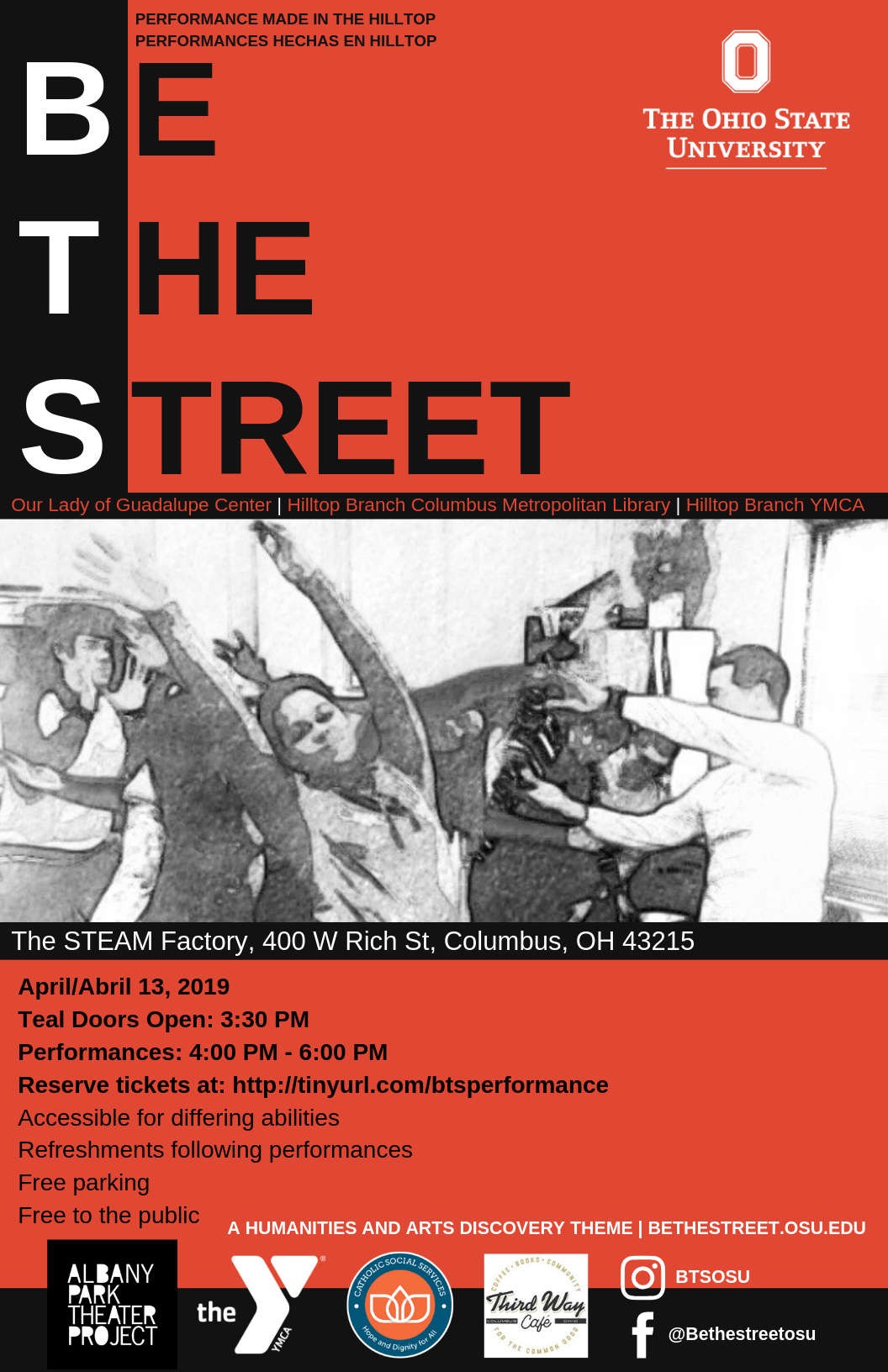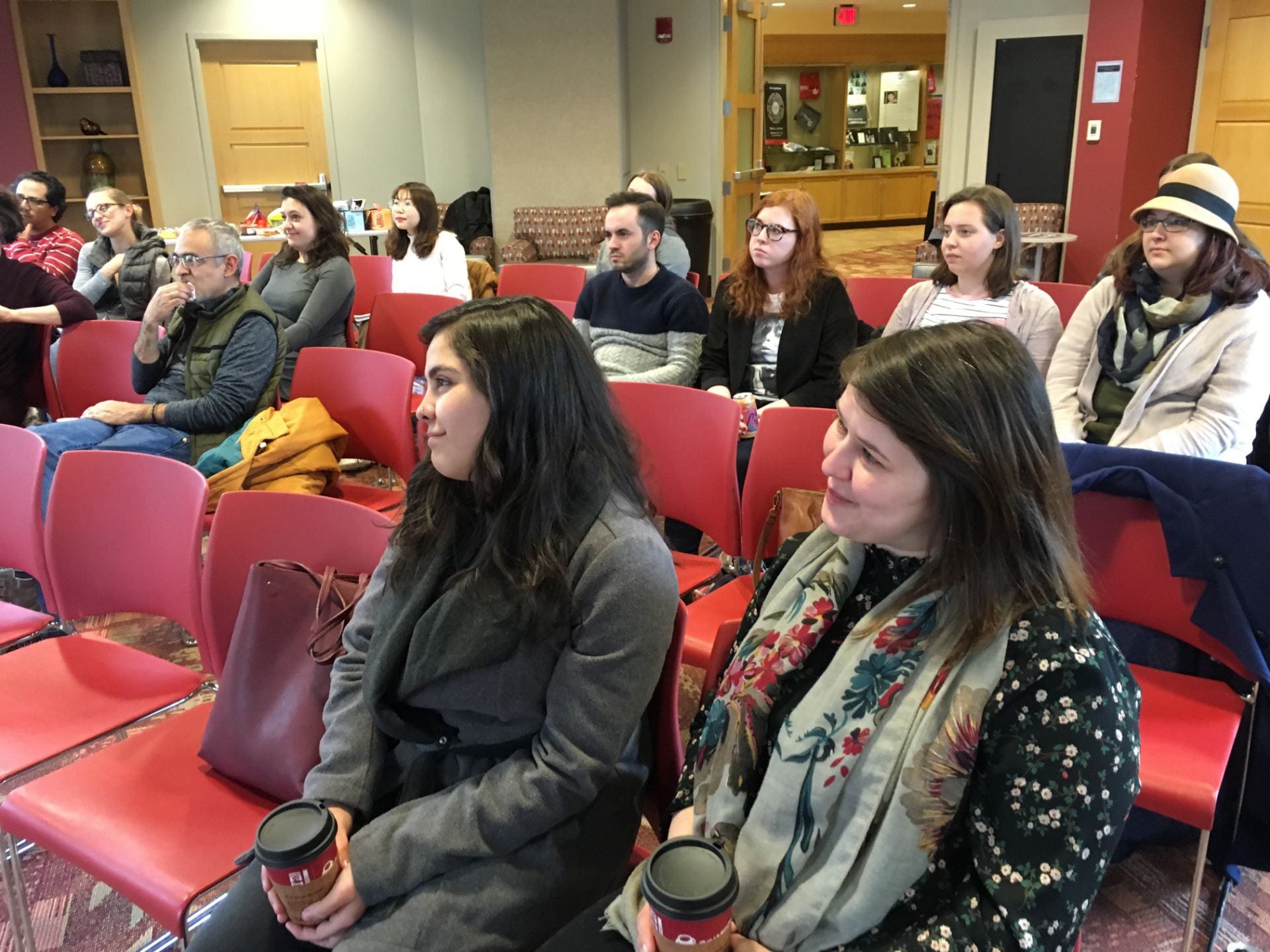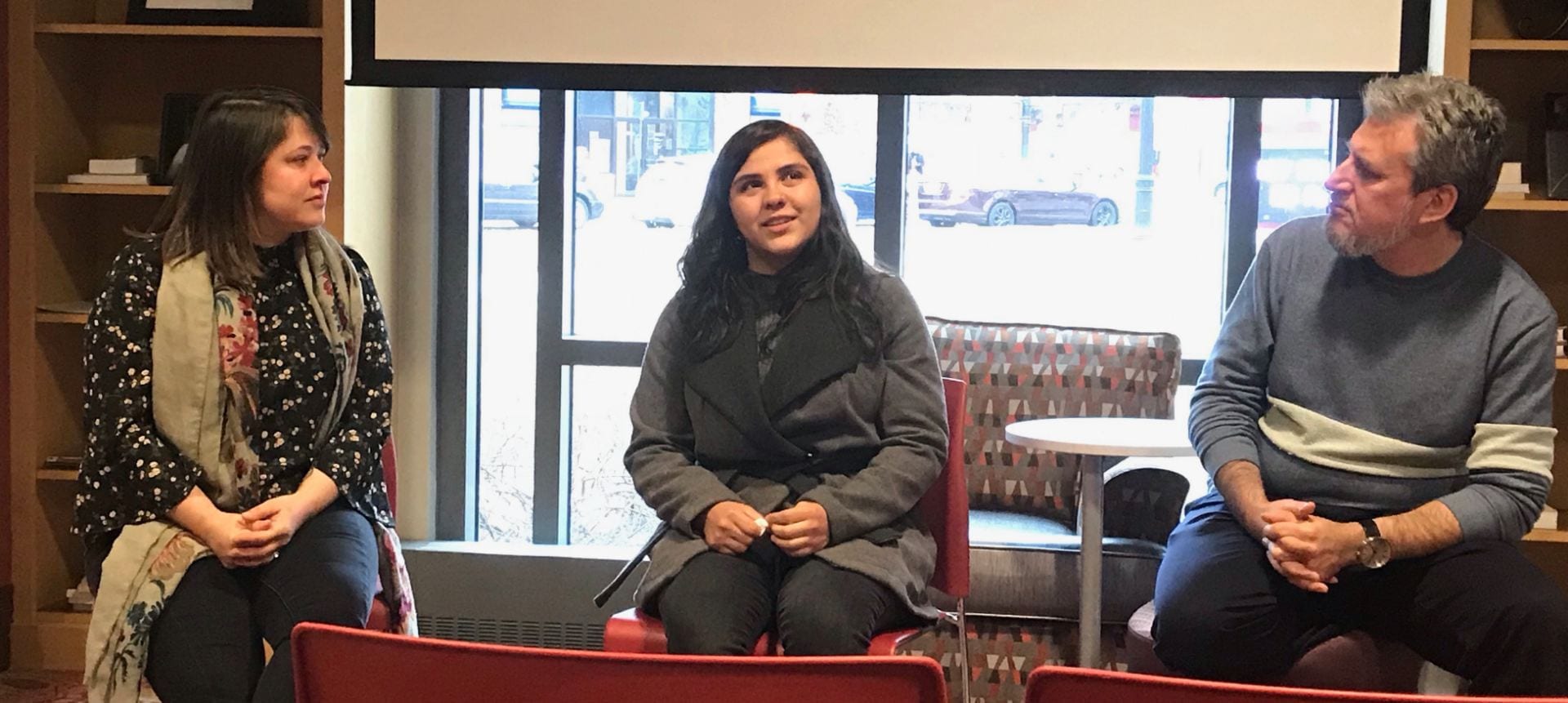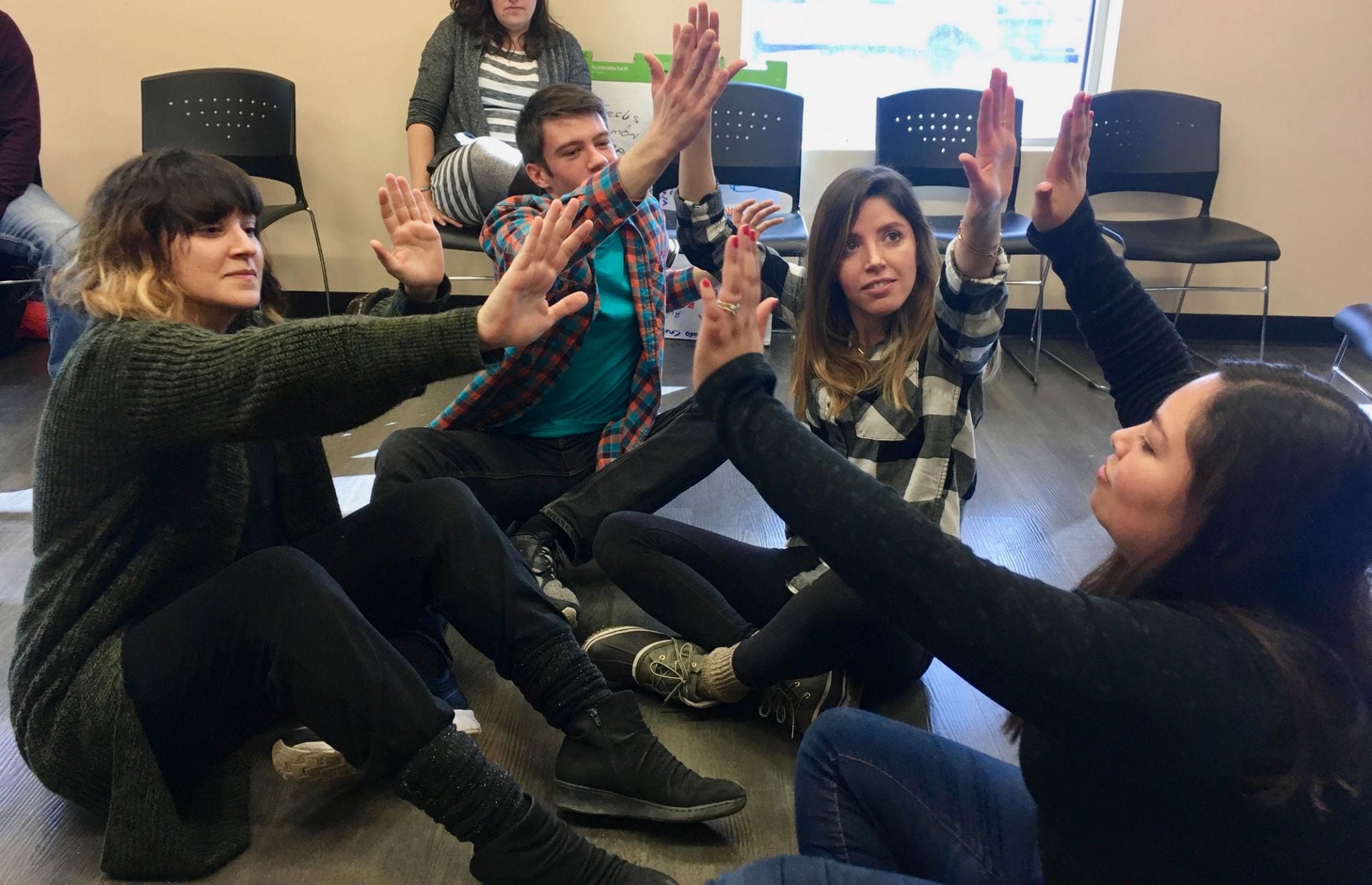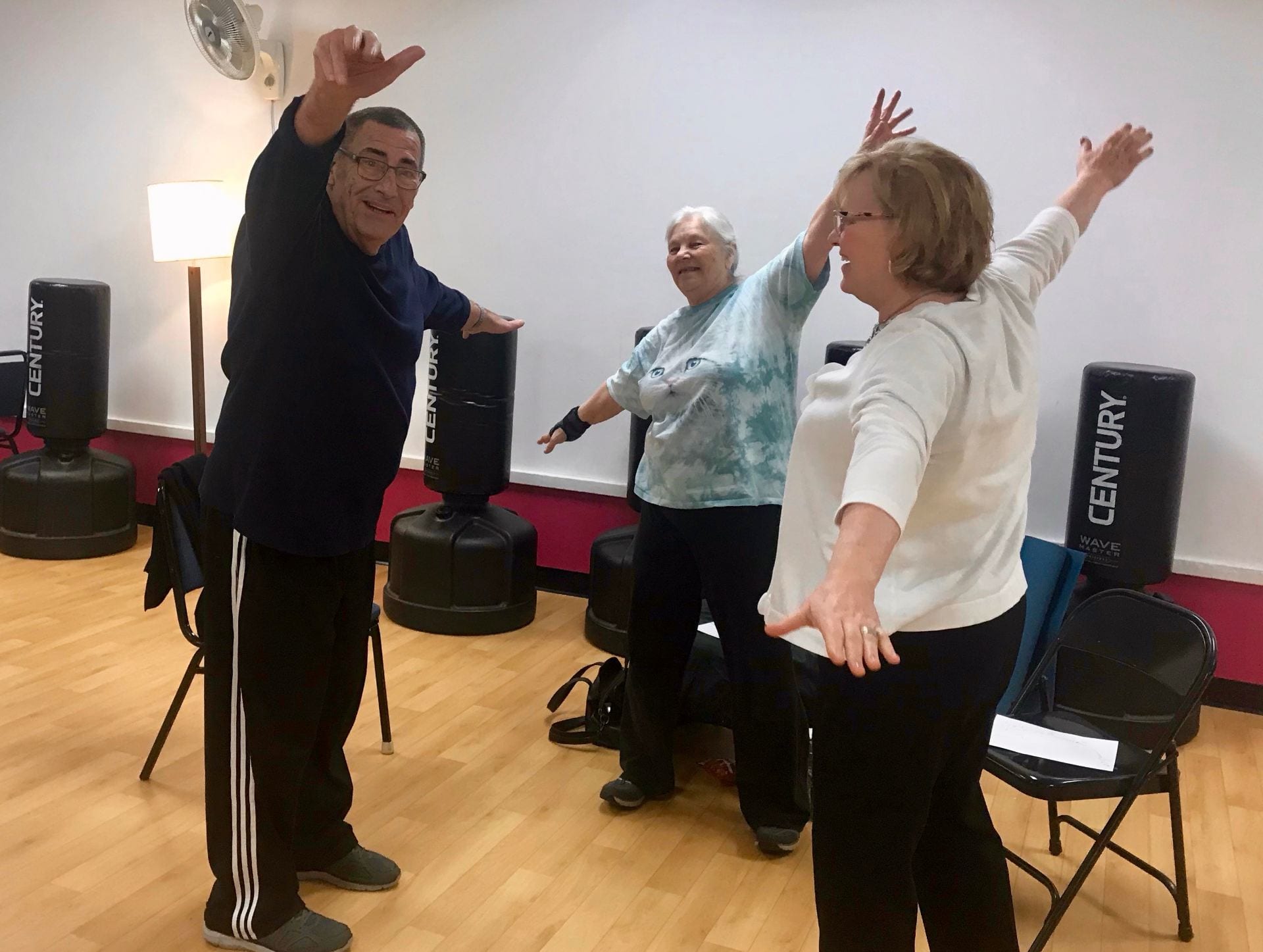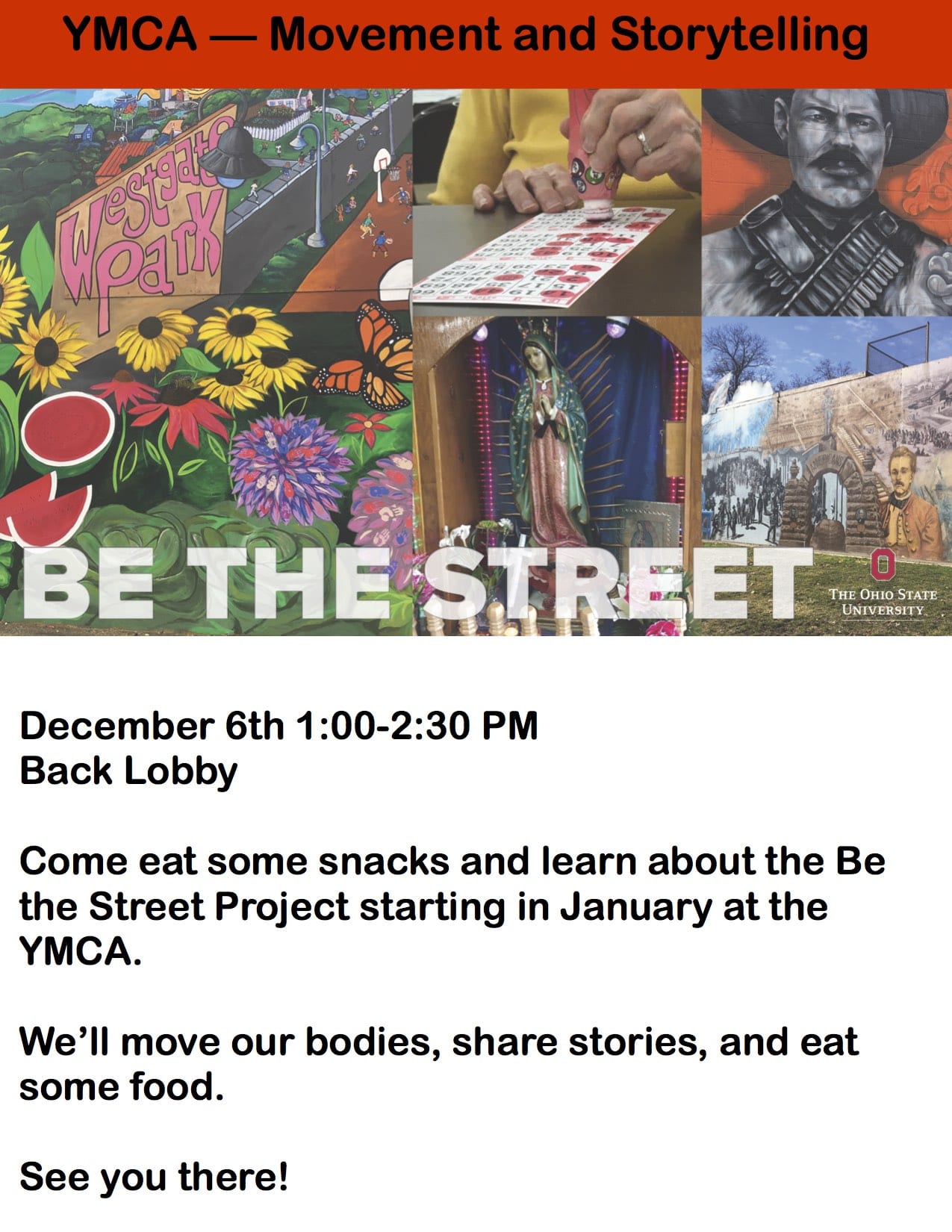I’m excited to present to you, the Our Lady of Guadalupe Center’s and the YMCA’s 2019 performances! The Library teens video will be coming soon! Check them out, here!
Author: flagler.4
Mi Experiencia Como Facilitador y Estudiante
Por Sebastián Muñoz | El 29 de abril, 2019
The Hilltop Communities of Columbus 2019
Devising Performance with a Community-in-Flux
In my time working with Be the Street at the Hilltop Library, I’ve gotten to know dozens of brilliant, generous, funny, creative, and courageous young people. Together we’ve told stories, built community, played countless theatre games, and have had a wonderful time doing it. That being said, devising performance with teenagers carries some unique challenges. Devising performance with teenagers in a public library without the structure of after-school-style programming adds a few extra layers to those challenges.
Many of the obstacles we faced to developing our ensemble were due to a combination of the age of our participants and the nature of the public library as a community space. Because many teens only come to the library when there is a specific gathering (often Dungeons and Dragons-related), most are not there every day, or alternatively, their attention is divided between potential activities. For the first six weeks of the project we had one or two consistent participants while the rest of the group consisted of teens just so happened to be in the library on a Friday afternoon. Since kids are often not in charge of their own schedules, many could not guarantee whether they would be able to return the following week. Getting grounded at home could mean that they would no longer be able to come to the library after school; getting a phone taken away would mean that they could not contact us, nor could we remind them about upcoming workshops. For minors we needed signed permission slips from parents for general participation in the program, compensation, photo releases, and transportation to and from the actual public performance. As the teens are often at the library before we arrive and waiting for a ride home after we leave, each of those permission slips had to complete the journey from the workshop to their homes to their parents to school and back to the following week’s workshop.
With guidance from the Albany Park Theatre Project, the Be the Street Library team was eventually able to craft a workshop structure and final performance piece that could work with rather than against our community-in-flux. One of the things we did in workshops after the first few weeks was to create a consistent routine. We began every rehearsal with the same check-in (Bam-Pow!) and played a focusing game which emphasized group listening. At the end of the story-gathering or skill-building portion of our workshop the group would stand in a circle and together put our “best foot forward” to move into the rest of our week.
Having familiar activities allowed teens to step back into the workshop space even if they had missed the previous week. The ensemble members who could attend consistently quickly stepped into leadership roles, volunteering to explain our activities to newcomers.
Traditionally, theatrical performance relies on an extensive rehearsal period with the same group of people telling a single narrative. Early on in the process we knew that we would need to take an alternate approach. Our strategy was to use a performance structure that highlighted each individual’s story and allowed for a flexible way to show the ensemble-based nature of our project. It had to provide an opportunity to work as a group but not rely solely on any one person.
The final performance was assembled from a combination of poetry and stories told in previous workshops. Each performer had an opportunity to tell their own story about a time that they stood up for something they believed in or a time that they felt truly accepted (themes that emerged from earlier workshops). The rest of the group worked together to create frozen images, or tableaux, to support the storyteller’s narrative. Participants wrote their own individual poems inspired by the prompt: “What ingredients would make up a recipe for you?” and the ensemble cut up and rearranged all of the lines into a single poem that served as the through-line for the whole piece. Although some of the original authors were not able to be part of the community sharing, the teens who assembled the poem decided to include lines that resonated with them and were excited to speak the words their friends had written on stage. Ultimately, the community of teenagers represented in the Hilltop Library group’s “A Cookbook for Us” extended far beyond the seven artists who the audience got to see.
………………….
Check out more of facilitator Nicholas Shannon Savard’s blog entries about Be the Street here
Public Sharing April 13th
Announcing our April 13th public sharing of work!
Please follow this link to reserve your seat:http://tinyurl.com/btsperformance
Performances Made in the Hilltop/ Performances Hechas en Hilltop
BE THE STREET — OUR LADY OF GUADALUPE CENTER | HILLTOP BRANCH COLUMBUS METROPOLITAN LIBRARY | HILLTOP BRANCH YMCA
THE STEAM FACTORY — 400 W. Rich St., Columbus, OH 43215
April/Abril 13 4:00PM – 6:00 PM
Accessible for differing abilities, refreshments following performances, free parking, free to the public
A HUMANITIES AND ARTS DISCOVERY THEME
Inside the Creative Process with Facilitator Anna Guse
Join facilitator Anna Guse for a discussion of her creative process with Be the Street and the Hilltop YMCA!
Remember to follow us on social media: Instagram @BTSOSU & Facebook
Following BTS on Social Media
As we approach our spring performance on April 13th, be sure to follow us on social media to stay up to date on all the fun we’re having at the Hilltop YMCA, the Hilltop Branch of the Columbus Metropolitan Library, and the Our Lady of Guadalupe Center.
We’re on Facebook
and
Instagram: @btsosu
Artist Talk and Albany Park Theater Project Residency
On stage and in community performance workshops for youths and adults, the Albany Park Theater Project challenges inequality and racism by asking people to bear witness to stories that might otherwise get overlooked or misrepresented. APTP performances humanize complex issues like immigration, foreclosure, poverty, abuse, hunger. Audience members emerge from their journeys at APTP with greater respect for the struggles and dreams of others – and with a desire to learn, have genuine dialogue, and take action. In the process of creating original plays, APTP has joined grassroots organizations throughout Chicago fighting against detentions and deportations, new prisons, foreclosures – and in support of humane immigration policy, investment in neighborhood schools, affordable housing, and more.
On Thursday, February 28th, Migration, Mobility and Immobility hosted Artist in Residence, David Feiner of Albany Park Theater Project. Feiner’s talk, “Performing Migration, Mobility, and Immobility” was hosted in collaboration with the Multicultural Center, the Performance Studies Working group, and Discovery Theme’s Be the Street. In his artist talk, Feiner described APTP’s thirteen-month process for creating a piece of theater entitled Home/Land, which opened in Albany Park in 2012 and later went on to the Goodman Theatre. Home/Land is an ethnographic theater piece created by APTP’s youth ensemble that “brings to theatrical life a collection of real-life stories of desire, risk, resilience, heroism, love, and hope – as immigrant families strive to stay together and make a better life in the land they’ve come to call home” (Feiner 2012). A piece structured in three acts, Home/Land explores origin stories, a demonic system, and small miracles.
Feiner emphasized that in the APTP youth ensemble, they start with themselves and then expand outwards. He spoke of how important it is at APTP that artists have direct connections to a subject matter and shared that this piece was particularly resonant as a quarter of the ensemble members were undocumented, themselves. APTP’s ethnographic process began with story circles and then progressed to attending rallies and planning meetings. At these events, the ensemble met leaders of the movement and these encounters led to interviews. At each interview, the youth would ask, “who else should we be talking to?” Conversations with a father, Padre José, and a group that called themselves, “Women divorced by ICE” greatly influenced the piece. Feiner remembered the women commenting that it was so important to meet young people who wanted to hear their stories. Comments like these frame APTP’s work in memorializing this moment of the immigrant justice movement.
Following Feiner’s talk, there was a Q&A with Director Maggie Popodiak and Actor Stephany Perez. During this Q&A, we discussed some of the complexities of ethnography, the impact it had on the young people in the ensemble, and how the relationships with interviewees and activism continued after Home/Land opened.
In addition to this artist talk, APTP’s residency included David, Maggie, and Stephany visiting Be the Street’s community workshops and providing feedback to the graduate student facilitators as they create original performances with folks in the greater Hilltop area.
February 28th: Migration, Mobility, and Immobility Artist in Residence – Open to the Public
David Feiner and Albany Park Theater Project
“Performing Migration, Mobility, and Immobility”
Thursday, February 28, 2019 4:00-5:30pm
Alonso Family Room, Multicultural Center
Free – no ticket needed
For 22 years the Albany Park Theater Project’s teen ensemble and adult theatre have designed world-class original theatre inspired by ethnography and real-life stories from immigrant and first-generation communities in Chicago. On stage and in community performance workshops, the Albany Park Theater Project challenges inequality and racism by asking people to bear witness to stories that might otherwise get overlooked or misrepresented.
APTP performances humanize complex issues like immigration, foreclosure, poverty, abuse, hunger. Audience members emerge from their journeys at APTP with greater respect for the struggles and dreams of others – and with a desire to learn, have genuine dialogue, and take action. In the process of creating original plays, APTP has joined grassroots organizations throughout Chicago fighting against detentions and deportations, new prisons, foreclosures – and in support of humane immigration policy, investment in neighborhood schools, affordable housing, and more.
David Feiner has co-directed, devised, and produced all of Albany Park Theater Project’s nineteen world premieres. With APTP, David’s honors include the Goodman’s August Wilson Award, the Coming Up Taller Award from the President’s Committee on the Arts and Humanities, the Midwest Human Rights Award from National Immigrant Justice Center. In 2016, APTP was named a recipient of the prestigious MacArthur Award for Creative and Effective Institutions.
Co-organized by the Migration, Mobility and Immobility Project, Be The Street, and the Performance Studies Working Group.
YMCA Informational Workshop 12/6/18
Artistic Director Moriah Flagler will lead an informational workshop for interested participants at the Hilltop YMCA: 2879 Valleyview Dr, Columbus, OH 43204.
For more information click here to contact Moriah.


